Use the equality duties to inform decision-making
In Northern Ireland public authorities are required to have due regard to the need to promote equality of opportunity and to have regard to the desirability of promoting good relations generally and including when developing COVID-19 related policies.
These are continuing duties and are important duties to observe, even in the context of COVID-19 when policies may need to be developed at pace. The Commission has recently issued an advice note for public authorities on implementing the Section 75 duties and continues to provide advice to public authorities during this time.
Collect comprehensive equality data to identify equality impacts and shape targeted actions to advance equality
To inform effective responses, tailored to the specific circumstances and needs in Northern Ireland, we recommend that all relevant measures are not only tracked in aggregate but also tracked for the impact on individuals from across each of the Section 75 equality grounds.
Education information systems (such as C2K) should collect and disaggregate data by equality ground to identify any differential impact of the COVID-19 outbreak on educational access, attainment or progression.
Departments and public authorities, including statistical agencies, should in general ensure that where they are collecting data they should do so across the full range of equality grounds so that the design, delivery and review of any changes to law, policy or service provision is improved by access to comprehensive analysis. We recognise that there are some limitations to meaningful data disaggregation, however where robust to do so disaggregation would provide greater information to inform the better targeting of policy interventions.
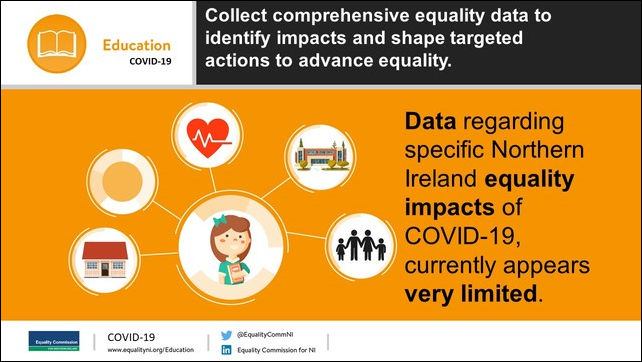
Maximise collaborative approaches to identify and respond to barriers to education
Action should be taken to ensure that transparent and accessible information is available, and that stakeholders from across the range of equality categories are fully involved in developing and delivering solutions in response to the impacts of COVID-19 generally, and for specific equality groups.
Harnessing relevant expertise and experience, including in rapid response scenarios, will better enable the identification of key issues and the delivery of more effective outcomes.
Developing programmes that involve families and wider communities, alongside education providers, in delivery will further inform and enable targeted local responses to specific barriers to education for pupils and learners across the range of equality groups.
Mitigate the negative impact on children of the closure of pre-school settings caused by the COVID-19 outbreak
The loss of over one term of pre-school education will have a detrimental impact on children’s development, in at least the short term. Those for whom it usually has the most significant impact, including children from minority ethnic communities and new residents, and children with disabilities, will likely feel the loss most acutely.
Steps must therefore be taken to identify and mitigate any particular equality impacts in Northern Ireland so that COVID-19 does not unfairly impact upon the educational progression and trajectory of children from specific equality groups.
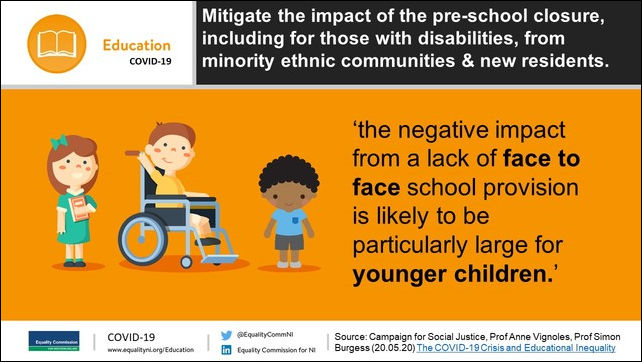
Take action to identify and mitigate potential equality impacts arising from reduced access to formally taught education
Action should be taken, in collaboration with learners, their families, and the broader community, to identify and address key equality issues, including any associated with:
- The loss or reduction of access to full-time formally taught provision with trained teaching and/or support professionals.
- The extent to which supports including specialist equipment, personal care or assistants for children with SEN and disabilities will be in place outside of formally taught environments (schools, including special schools or further or higher education settings);
- Any impact of reduced social interaction with peers and teaching professionals, including for those requiring specialist or language support.
Consideration should also be given to the provision of dedicated programmes of formally taught education to provide ‘catch up’ learning for those most adversely affected by the loss of learning due to school closures. Such programmes should take account of lessons learnt from relevant programmes in Northern Ireland – for example, the Delivering Social Change ‘Literacy and Numeracy Programme’ which used newly qualified teachers to deliver tuition to children and young people who were ‘struggling to achieve even the basic educational standards’.
We also have previously highlighted the positive outcomes of a number of extended schools and full service community network programmes and we recommend that existing support programmes are redesigned so far as possible to provide remote services at this time.
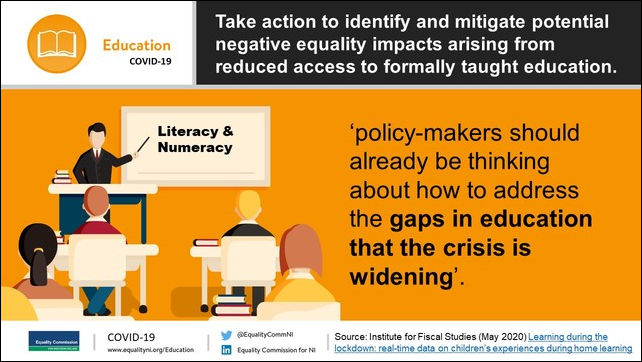
Address any negative equality impacts arising from the shift to home-based learning
Action should be taken, in collaboration with learners, their families, and the broader community, to identify and address key equality issues, including any associated with differences in the effectiveness of the home learning environment, including:
- access to appropriate space to learn and study;
- access to educational or curriculum support materials;
- the accessibility of digital materials – either due to access to IT equipment or broadband, or the accessibility standards of the materials themselves.
- the circumstances and abilities of parents, carers or siblings to support learning – including in the context of wider family, caring and/or work commitments;
- access to related specialist support and equipment – in particular for those children with disabilities or special educational needs; and those in need of language or wider support – including Traveller, Roma and Newcomer children.
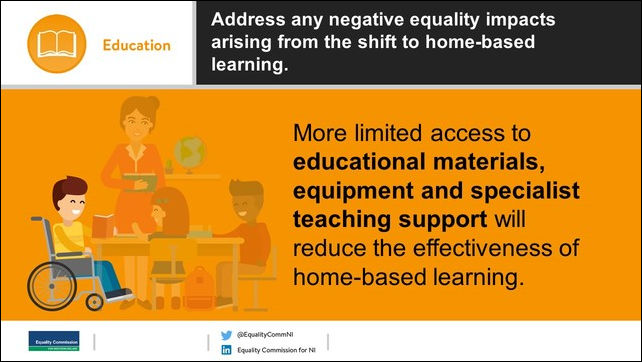
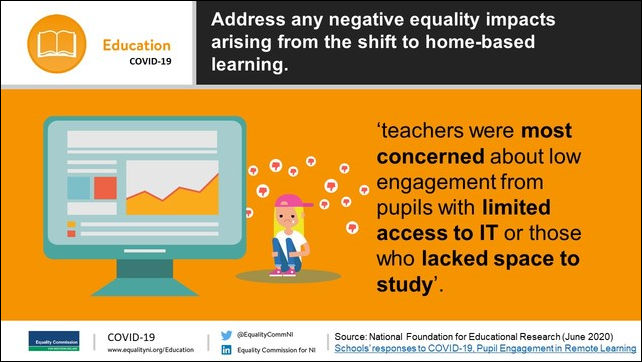
Identify and mitigate potential negative equality impacts arising from any move to ‘blended’ learning
The social, emotional and academic impacts of returning to part-time taught provision, and a ‘new-normal’ of social distancing will present challenges to learners and families.
As more parents and carers return to work outside of the home, potential differential impacts of blended (home and formally taught) learning upon families, and the children and young people within them, must be built into planning.
Particular concerns arise for certain equality groups. Action should be taken to identify and address key inequality issues, including any associated with:
- How children and young people with particular disabilities, such as autism, or special educational needs will be supported to adapt to a changed or changing learning environment;
- The risk that children and young people with traditionally lower attendance and transitioning rates such as Traveller and Roma children will not return to school or have lower attendance rates than previously;
- That children and young people who have, or perceive themselves to have, fallen behind their peers due to an inability to engage in home-based learning may disengage from formal education. This potential disengagement may be exacerbated when attendance is part-time and phased.
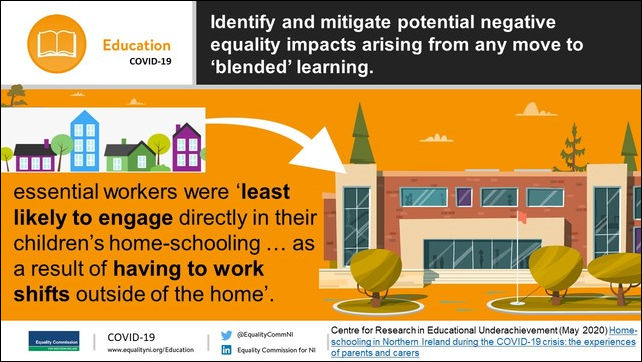
Consider the equality impacts of decisions regarding assessment and any opportunities to better promote equality
Given decisions that older children, specifically those at GSCE, AS or A-level, will not this year be required to sit examinations, consideration should also be given to how any equality impacts might be mitigated or eliminated, both with regards to exam grades and any differential impact on the ability of individuals to continue in education or progress to further or higher education.
For younger children, in the context of post-primary transfer, the current intention to delay slightly but continue with exam-based assessment for post-primary transfer has the potential to also result in differential equality impacts.
The Department may wish to satisfy itself of the consistency of its approach, in a context where it has moved to support alternative (non-exam based) assessment methodologies for older pupils at GCSE, AS and A level (which will subsequently be used to facilitate transfer to later stages of education); but not for younger pupils where transfer to post-primary grammar education will still be permitted and facilitated in a number of instances by exam based assessment (post-primary transfer to some grammar schools).
The Commission has also identified a range of concerns about the impact of the COVID-19 outbreak upon the academic, social and emotional development of children, and the need for effective and concerted action to overcome them. Any considerations regarding the continuation of examination-based assessment for post-primary transfer should be considered in these contexts.
A number of post primary schools which usually use the GL and AQE test results to allocate places have announced that they will not use academic selection this year. As with older children, there is a need to consider and mitigate any equality impacts arising from any alternative methodologies or criteria that are adopted.
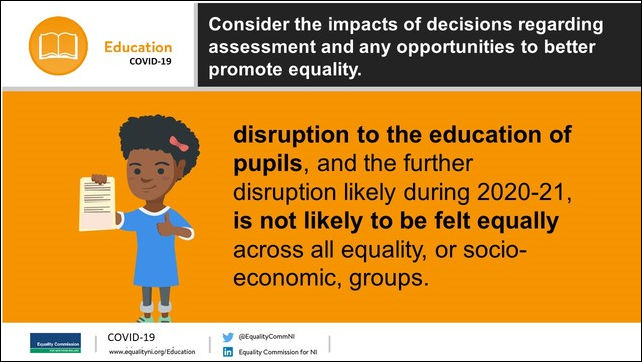
Ensure that the benefits of sharing in education are maintained now, when schools reopen, and as social-distancing is relaxed
The positive impacts of sharing and social contact should not be lost as a result of the COVID-19 pandemic. We recommend that a focus on sharing in education is maintained at a Departmental, management and schools’ level.
We note a reference in a June 2020 Department of Education circular on remote learning that:
Remote learning provides opportunities for collaborative and clustering arrangements between and within schools to explore co-planning and co-teaching, for example to provide thematic experiences which offer learning across the curriculum.
Action should be taken now to ensure that shared classes, projects and experiences can be planned and progressed while meeting social distancing and other requirements.
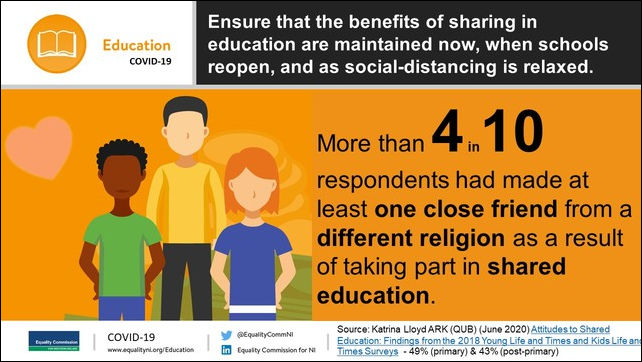
Deliver strong and visible leadership to maintain and promote an anti-bullying culture within education
High-level leadership, including from Principals, senior management and Boards of Governors, is essential to ensuring the consistent and robust implementation of policies and practices designed to address bullying, including bullying experienced by children and young people across the equality grounds. Education providers should proactively promote awareness of the existence, content and intent of their anti-bullying policy and procedures; and respective roles, responsibilities and expected behaviours.
Evidence is currently limited as regards the impact of the COVID-19 pandemic upon the attitudes and potential behaviours of children and young people in Northern Ireland towards certain minority ethnic groups, but there is the potential that negative attitudes could be exacerbated. Action is required to address this.
Assist schools in making effective use of dual language resources to help Newcomer learners access the curriculum
The Department of Education and Education Authority should take action to ensure that any potential negative impact on Newcomer pupils’ language development and social interaction with peers is mitigated, including through the effective dissemination of dual language resources and provision of IT equipment.
We note that Newcomer children, entitled to free school meals, are to be prioritised in the Education Authority scheme to loan laptops to pupils. We however recommend that provision for internet access, where required, is also made available at the same time.
Barnardo’s 2015 research Feels Like Home pointed to a number of areas of good practice including after school clubs, translated newsletters and a growing use of technology to communicate with parents. We recommend that steps are taken to maintain contact with, and between, these pupils.
Identify and address any effects of COVID-19 that poverty or socio-economic status may have on equality groups
In all of the Commission’s work, we are mindful that the barriers and inequalities experienced by equality groups can be exacerbated by poverty and social exclusion.
In this context, we again highlight the link between poverty and social exclusion, and wider inequalities, and stress the need for urgent action to address poverty and social exclusion experienced by a range of equality groups.
Learning from the pandemic
Northern Ireland’s education system can learn many lessons from the pandemic and family and community engagement, some of them perhaps surprisingly positive.
The Equality Commission asked 13 educationalists, charities and community and voluntary sector organisations for their thoughts on how learning from the last year can help to reduce educational inequalities.
Download the findings:
Contact us
If you would like to dicuss this area of our work further, please contact Deborah Howe, Policy Manager, by email:
dhowe@equalityni.org or Tel: 028 90 500 599.